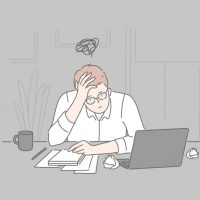Everyday Anxiety
Published on September 1st, 2015
Updated on January 2nd, 2024

Anxiety is rampant in our society. Many of us struggle to keep pace with daily life yet seem to demand more of ourselves. Familiar statements begin with, “I should, I must or I have to.” Our sense of obligation seems to have skyrocketed, with many feeling responsible for circumstances beyond their control. In the swirl of constant activity, it is important to learn about how to manage everyday anxiety.
What Is Anxiety?
Many types of anxiety can occur for a variety of reasons. Anxiety is most simply defined as a heightened response to normal stressors and/or situations. It is important to distinguish between everyday anxiety and anxiety disorders. Anxiety disorders may require mental health treatment if it interferes with participation in activities, including:
- Social events
- Relationships
- Work
- School
- Errands
Many people experience anxiety when dealing with everyday stress, like giving a work presentation or other situations that require you to perform. You may feel apprehensive, jittery, or nauseous, or feel pressure to overprepare. You may experience headaches, nausea, or feel unsettled.
Sponsored by

Choose a therapist to work with and start healing with 20% off from BetterHelp.
Click HereWhat You Can Do To Lower Your Anxiety
- Relaxation techniques (meditation, progressive muscle relaxation, visualization)
- Yoga
- Creative activities (painting, writing, sculpting, photography, music, and more)
- Regular exercise routine
- Good nutrition
- Regular sleep routine
- Increasing supportive and fun relationships
Many of these suggestions are self-explanatory. However, I would like to expand on relaxation techniques, creative activities, and increasing supportive and fun relationships. I have included three specific relaxation techniques. Each of these work to calm the nervous system and return focus to the present moment.
Relaxation Techniques
Often, anxiety centers around an event that might happen in the future. Building one’s connection with the here and now may interrupt the anxious response. One option to consider is enrolling in a group relaxation class. This may also provide an opportunity to increase supportive and fun relationships.
Creative Activities
Creative activities may engage the right side of your brain and reduce overthinking. What would it be like to take a painting class? You would have to pay attention to what is happening in the moment- your brush, the canvas, the paint, your technique, your visual perspective of the object, and the painting. This experience engages all of you, except the part of you constantly thinking about what may or may not happen tomorrow. Creative activities can become a meditative experience, so taking an individual or group class might be enjoyable and relaxing.

Social Support
Anyone struggling with anxiety needs the support of loved ones. Asking a supportive friend or family member for help can relieve daily anxiety. Sometimes, knowing that others share similar concerns or situations lessens our anxiety and sense of isolation. Don’t be afraid to reach out and build more supportive friendships. You may even find someone with whom you can take a painting class.
Fear And Anxiety
Fear and anxiety are often used interchangeably, but there is a difference between being afraid and feeling anxious. Fear tends to simmer under surface anxiety. To understand my anxiety, it may be informative to understand the fear that drives it. For me, if you are aware of the fear that fuels your anxious responses, you can then pinpoint the source and work to develop coping skills with a therapist.

What To Do When You Feel Anxious
Mindfulness meditation or developing a yoga practice that focuses on deepening your breath may help when you are. Reducing caffeine intake is another common way to alleviate anxious responses and calm the nerves. Learning how to recognize that feelings of panic, fear, or anxiety are temporary can result in a more peaceful response.
Diet is another way to reduce worry. Some foods that may help with lowering anxiety include foods that are rich in Omega-3 fatty acids, magnesium, calcium, vitamin B, and tryptophan. Balanced nutrition is important to a physically, mentally, and emotionally healthy you!
Having a proactive life approach reduces physical and emotional tension. Try to accomplish daily tasks early so you don’t fall behind. Develop a schedule, prioritize tasks, and check them off as they are completed.
Life is full of constant change, which makes most of us vulnerable to feeling anxious sometimes. Many people face anxiety during major life transitions. Common transitions include:
- Job loss
- Divorce
- Relationship loss
- Career change
- Relocation
- Death
- Illness
Chronic anxiety can be a daily experience that prevents some people from participating in enjoyable activities. A person who has experienced trauma may need further evaluation for generalized anxiety or posttraumatic stress disorder.
Regardless of your situation, seeing a therapist can help identify and improve your symptoms or simply enhance your ability to cope. If anxious reactions to stress become chronic or you struggle to relax and feel calm, seek medical and mental health care from licensed professionals.
Sponsored by

Find an affordable therapist online with 20% off from BetterHelp.
Click Here






Leave A Reply